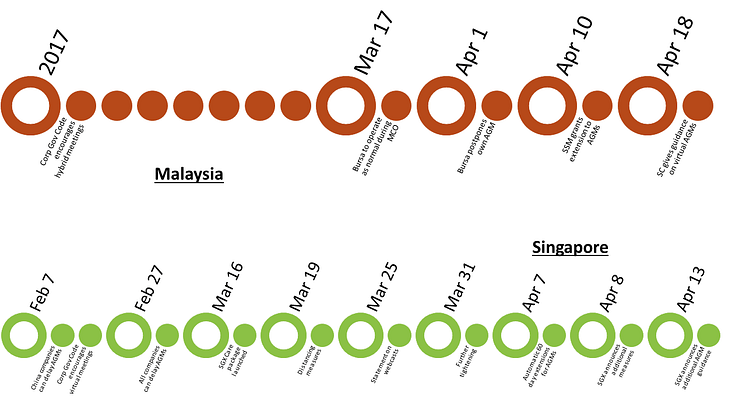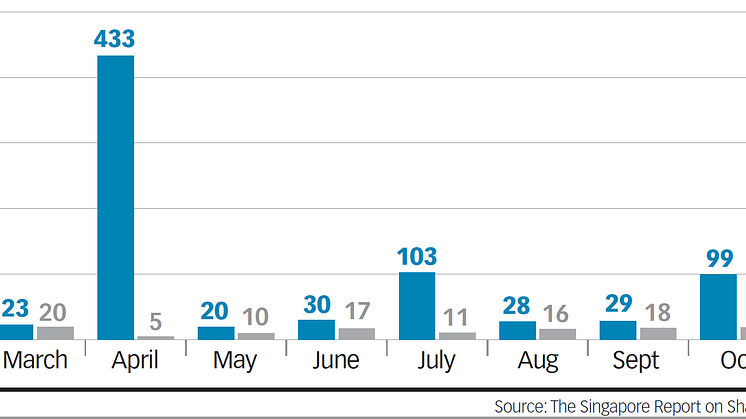
Blog post -
Virtual AGMs in a pandemic – What companies on both sides of the Causeway must know
Publicly-listed companies on both sides of the Causeway have had to deal with social distancing rules which effectively ruled out shareholders attending their Annual General Meetings – but the authorities have taken very different approaches to communicating this to companies.
Malaysia imposed a lockdown, the Movement Control Order (MCO), on March 18. The lockdown originally lasted two weeks until the end of March, but the government extended the order by two weeks and later added another two weeks until April 28.
Singapore started its Circuit Breaker on April 7, and it is expected to last until May 4.
The lockdowns require employees in non-essential services to work from home. As these dates fall in the busiest reporting period of the year for listed companies that are required to file their annual reports and hold their annual general meetings (AGM), the regulatory authorities in both countries have responded by extending deadlines.
But holding physical AGMs is not tenable in a pandemic, so virtual AGMs are the most viable solution. They provide expanded reach and potentially higher participation from shareholders. The data from the interaction online will also help the company track the success of the event, and help save the cost of in-person AGMs.
We have gone through the announcements of the authorities in both countries to see how quickly they have responded, and the speed at which they adopted virtual AGMs.
Malaysia
Bursa Malaysia responded to the government’s announcement of the MCO by stating on March 17 that it would operate as per normal during the period.
Only on March 26 Bursa announced its first measures to help companies deal with the COVID-19 situation. Listed companies were given a one-month extension to submit their financial statements.
On April 1 Bursa postponed its own AGM to April 29, and while it will still be held at Connexion Conference & Event Centre, the exchange encouraged shareholders to participate remotely.
On April 10, the Companies Commission of Malaysia (SSM) said it would grant an extension of time for listed companies to hold their AGMs up to three months after the MCO ends, with the companies affected required to apply for the extension.
The announcements from the authorities did not publish guidance on virtual AGMs for all listed companies.
Bursa responded to our queries saying it was the first company in Malaysia to offer remote participation and voting for its shareholders at its AGM in March last year. They referred us to the Malaysian Code on Corporate Governance 2017implemented on April 26, 2017 – almost three years ago – where under Conduct of General Meetings, 12.3: companies with “large numbers of shareholders or have meetings in remote locations are encouraged to leverage on technology to facilitate electronic voting and remote shareholders’ participation”.
We have not been able to find further updates on this during the current pandemic.
On April 18 the Securities Commission (SC) broke the radio silence saying listed companies should conduct only virtual AGMs, and that there should not be more than eight essential individuals physically present at the broadcast venue. This should include the Chairperson of the general meeting, who may be joined by the CEO, CFO, the company secretary, the auditor and people providing audio-visual support.
“We also encourage companies to continue leveraging technology, even beyond the MCO period, to conduct meetings in a manner that will encourage and enable full shareholder participation, even from remote locations,” said Chairman, Datuk Syed Zaid Albar.
Singapore
SGX made its first COVID-19-linked announcement about AGMs on February 7 when SGX RegCo said it would give listed companies based in China until 30 June to hold their AGMs.
On February 27 SGX RegCo said it would give all listed companies an additional two months to hold their AGMs due to the virus outbreak.
It also said companies can explore alternative arrangements such as organising virtual information sessions before their AGMs, or providing a simultaneous webcast of the AGM proceedings, to provide shareholders with a forum to ask questions and engage with management and the board of directors. Shareholders must also vote by appointing the Chairman as their proxy.
On March 16 SGX announced a S$5 million care package to provide support and relief measures for listed companies. The package includes the AGM Facilitation Grant of up to S$5,000 per listed company to help cover AGM-related expenses. These could include booking additional meeting rooms and additional teleconference lines, or implementing a webcast or “other virtual solutions”.
Three days later, on March 19, it guided that due to social distancing measures listed companies should consider segregating attendees to the AGM across various venues, such as separate rooms in the same building. Video links could be provided to allow attendees at each venue to participate. In line with the advisory on March 13 by the Ministry of Health on social distancing measures, it advised that listed companies should reduce attendance at the venue to fewer than 250 people.
The Securities Investors Association Singapore (SIAS), representing retail shareholders, released a statement on March 25 advising shareholders to avoid AGMs in person and to follow the AGMs via webcasts instead.
On March 31, ACRA, MAS and SGX RegCo announced a set of guidelines that supersede those on 19 March. This is because the Infectious Diseases (Measures to Prevent Spread of COVID-19) Regulations 2020 had come into force, which meant events could only have a maximum of 10 attendees, and had to include safe distancing measures.
It also said listed companies that chose to hold their AGMs before the initial deadline of 30 April were required to provide the opportunity for their shareholders to ask questions, stream the meeting through a live webcast and allow for proxy voting. Multiple further announcements followed giving very specific guidance to companies at www.sgx.com/regulation.
On April 8 SP Corporation announced it had received permission from SGX to hold its AGM as a webcast on April 16. The virtual event, which was held at the company’s office, did not accept any physical attendance from its shareholders. The Ministry of Trade and Industry has exempted SP Corporation from the suspension of non-essential workplace activities during the Circuit Breaker period.
Related links
- Frequently asked questions (FAQs) on movement control order
- Malaysia’s movement control order further extended until Apr 28: PM Muhyiddin
- What you can and cannot do during the circuit breaker period
- BURSA MALAYSIA TO OPERATE AS NORMAL
- BURSA MALAYSIA STRONGLY ADVISES REMOTE PARTICIPATION AND VOTING FOR ITS SHAREHOLDERS AT THE UPCOMING ADJOURNED 43rd ANNUAL GENERAL MEETING TO BE HELD ON 29 APRIL 2020
- SSM Umumkan Tujuh Inisiatif Untuk Kurangkan Beban Sektor Korporat Semasa Perintah Kawalan Pergerakan ( PKP)
- Malaysian Code On Corporate Governance
- SC ISSUES GUIDANCE ON VIRTUAL MEETINGS FOR LISTED ISSUERS
- SGX RegCo gives issuers up to 30 June 2020 to hold AGMs to approve FY Dec 2019 results amid 2019-nCoV situation
- SGX RegCo gives additional two months to issuers to hold AGMs due to concerns about large-group meetings amid COVID-19
- SGX introduces S$5 million Care Package to provide support amid COVID-19
Topics
Categories
- CEO
- MAS
- Singapore
- CFO
- pandemic
- Malaysia
- Live webcast
- AGM
- SP Corporation
- Ministry of Trade and Industry
- shutdown
- Ministry of Health
- ACRA
- SIAS
- SGX
- lockdown
- Circuit Breaker
- Chairperson
- Securities Commission
- Securities Investors Association Singapore
- Bursa
- coronavirus
- COVID-19
- Annual General Meetings
- social distancing
- Virtual AGMs
- virtual AGM
- Connexion Conference & Event Centre
- Companies Commission of Malaysia
- Malaysian Code on Corporate Governance
- Datuk Syed Zaid Albar
- Securities Commission Malaysia
- SGX RegCo
- virus outbreak
- AGM Facilitation Grant
- Money Authority Singapore
- Accounting and Corporate Regulatory Authority
- proxy voting

